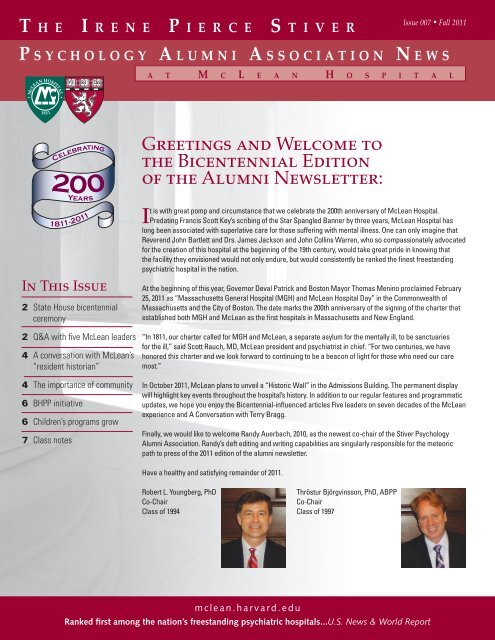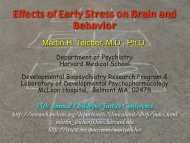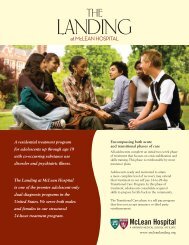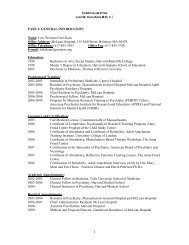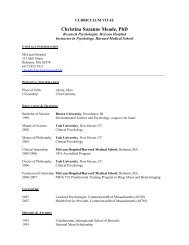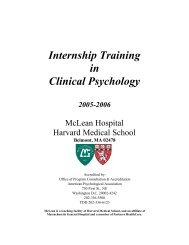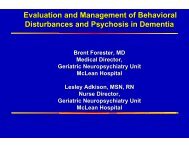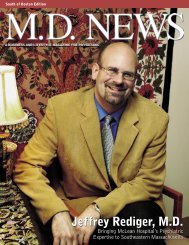Fall 2011 Newsletter - McLean Hospital - Harvard University
Fall 2011 Newsletter - McLean Hospital - Harvard University
Fall 2011 Newsletter - McLean Hospital - Harvard University
Create successful ePaper yourself
Turn your PDF publications into a flip-book with our unique Google optimized e-Paper software.
T H E I R E N E P I E R C E S T I V E R<br />
Issue 007 • <strong>Fall</strong> <strong>2011</strong><br />
P SYCHOLOGY ALUMNI ASSOCIATION NEWS<br />
A T M C L E A N H O S P I T A L<br />
Greetings and Welcome to<br />
the Bicentennial Edition<br />
of the Alumni <strong>Newsletter</strong>:<br />
In This Issue<br />
2 State House bicentennial<br />
ceremony<br />
2 Q&A with five <strong>McLean</strong> leaders<br />
4 A conversation with <strong>McLean</strong>’s<br />
“resident historian”<br />
4 The importance of community<br />
6 BHPP initiative<br />
6 Children’s programs grow<br />
7 Class notes<br />
It is with great pomp and circumstance that we celebrate the 200th anniversary of <strong>McLean</strong> <strong>Hospital</strong>.<br />
Predating Francis Scott Key’s scribing of the Star Spangled Banner by three years, <strong>McLean</strong> <strong>Hospital</strong> has<br />
long been associated with superlative care for those suffering with mental illness. One can only imagine that<br />
Reverend John Bartlett and Drs. James Jackson and John Collins Warren, who so compassionately advocated<br />
for the creation of this hospital at the beginning of the 19th century, would take great pride in knowing that<br />
the facility they envisioned would not only endure, but would consistently be ranked the finest freestanding<br />
psychiatric hospital in the nation.<br />
At the beginning of this year, Governor Deval Patrick and Boston Mayor Thomas Menino proclaimed February<br />
25, <strong>2011</strong> as “Massachusetts General <strong>Hospital</strong> (MGH) and <strong>McLean</strong> <strong>Hospital</strong> Day” in the Commonwealth of<br />
Massachusetts and the City of Boston. The date marks the 200th anniversary of the signing of the charter that<br />
established both MGH and <strong>McLean</strong> as the first hospitals in Massachusetts and New England.<br />
“In 1811, our charter called for MGH and <strong>McLean</strong>, a separate asylum for the mentally ill, to be sanctuaries<br />
for the ill,” said Scott Rauch, MD, <strong>McLean</strong> president and psychiatrist in chief. “For two centuries, we have<br />
honored this charter and we look forward to continuing to be a beacon of light for those who need our care<br />
most.”<br />
In October <strong>2011</strong>, <strong>McLean</strong> plans to unveil a “Historic Wall” in the Admissions Building. The permanent display<br />
will highlight key events throughout the hospital’s history. In addition to our regular features and programmatic<br />
updates, we hope you enjoy the Bicentennial-influenced articles Five leaders on seven decades of the <strong>McLean</strong><br />
experience and A Conversation with Terry Bragg.<br />
Finally, we would like to welcome Randy Auerbach, 2010, as the newest co-chair of the Stiver Psychology<br />
Alumni Association. Randy’s deft editing and writing capabilities are singularly responsible for the meteoric<br />
path to press of the <strong>2011</strong> edition of the alumni newsletter.<br />
Have a healthy and satisfying remainder of <strong>2011</strong>.<br />
Robert L. Youngberg, PhD<br />
Thröstur Björgvinsson, PhD, ABPP<br />
Co-Chair<br />
Co-Chair<br />
Class of 1994 Class of 1997<br />
mclean.harvard.edu<br />
Ranked first among the nation’s freestanding psychiatric hospitals...U.S. News & World Report
State House provides poignant<br />
backdrop for bicentennial ceremony<br />
More than 200 Massachusetts state legislators and <strong>McLean</strong><br />
<strong>Hospital</strong> and Massachusetts General <strong>Hospital</strong> leadership, staff<br />
and friends celebrated the 200th anniversary of the two hospitals during<br />
a moving charter renewal ceremony held at the State House on Feb. 25,<br />
<strong>2011</strong>. Held in the Senate Chamber, the ceremony marked the exact day<br />
two centuries ago that <strong>McLean</strong> and MGH were chartered. ♦<br />
Celebrating a symbolic signing of the <strong>McLean</strong> charter are, from left: <strong>McLean</strong><br />
President and Psychiatrist in Chief Scott L. Rauch, MD, House Speaker pro<br />
Tempore Patricia Haddad, Senate President Therese Murray and MGH President<br />
Peter Slavin, MD.<br />
Five leaders on seven decades<br />
of the <strong>McLean</strong> experience<br />
Interview by Robert L. Youngberg, PhD<br />
In light of the bicentennial, the <strong>McLean</strong> Alumni Associations included<br />
a special article highlighting different perspectives from past and<br />
present hospital leadership. Drs. Scott Rauch, Bruce Cohen, Steven<br />
Mirin, Shervert Frazier and Francis de Marneffe (co-chair, Psychiatry<br />
Residency Alumni Association) each chose two questions of interest<br />
from a list of six. The experiences encapsulated in their responses span<br />
seven decades of hospital leadership. Here are their responses.<br />
Scott L. Rauch, MD<br />
President and Psychiatrist in Chief, 2006 to present<br />
What does it mean to you to serve as president of <strong>McLean</strong>?<br />
It is a great honor and privilege to serve as president and psychiatrist<br />
in chief of <strong>McLean</strong> <strong>Hospital</strong>. This is an institution with a 200-year<br />
history of leading the field and serving people in need. I feel a profound<br />
responsibility to our patients and their families, to those who came<br />
before us and built the legacy of <strong>McLean</strong>, as well as to those who will<br />
follow us into the future. Perhaps it has always been so, but this feels<br />
like an especially exciting time in psychiatry, with abundant challenges,<br />
but also with extraordinary opportunities arising from emerging science<br />
and the promise of health-care reform. I can think of no better place<br />
from which to try and make a positive impact, nor any more dedicated<br />
team with which to work toward such worthy goals.<br />
What do you think motivates so many of us to remain connected to<br />
<strong>McLean</strong> long after our training has been completed?<br />
<strong>McLean</strong> is a truly unique place that inspires extraordinary loyalty.<br />
First and foremost,<br />
we are galvanized<br />
together through our<br />
shared commitment<br />
to a precious mission,<br />
focused on helping<br />
people who are among<br />
society’s most vulnerable.<br />
But beyond that, there<br />
is something special<br />
about the paradox of our<br />
academic subspecialty<br />
hospital—that we are<br />
at once wholly focused<br />
In back, from left: Francis de Marneffe, MD,<br />
Shervert Frazier, MD, Steven Mirin, MD,<br />
Bruce M. Cohen, MD, PhD. In front:<br />
Scott L. Rauch, MD.<br />
on psychiatry, while pursuing progress across a tripartite array of<br />
approaches that span compassionate care, research and education.<br />
This constitutes an incredibly rich environment within which to learn,<br />
develop and grow. For those fortunate enough to have spent our<br />
formative years here, it becomes a part of us—the culture from which<br />
we are born as professionals, a haven and a home. Hence, we are<br />
drawn back to <strong>McLean</strong> as a touchstone, a place to rekindle friendships<br />
and to renew ourselves as colleagues.<br />
Bruce M. Cohen, MD, PhD<br />
President and Psychiatrist in Chief, 1997 to 2005<br />
When you think of your tenure as president of <strong>McLean</strong>, of what<br />
advancement(s) are you most proud?<br />
2 Alumni News
Contrary to predictions that we would shrink and close, we grew and<br />
thrived. We opened more than 30 new clinical services, more than<br />
doubled the size of research and enhanced training programs and<br />
opportunities. We increased the proportion of the budget going to<br />
front-line colleagues: clinicians, investigators, teachers and support<br />
staff. Even in the leanest times, we raised salaries for staff every year.<br />
What do you think motivates so many of us to remain connected to<br />
<strong>McLean</strong> long after our training has been completed?<br />
What we learn and do here is crucially important to the lives of others<br />
and deeply rewarding to each of us. Our work, helping both our<br />
patients and one another, makes bonds that never break. <strong>McLean</strong> is a<br />
multigenerational family of all of us who have been here.<br />
Steven Mirin, MD<br />
President and Psychiatrist in Chief, 1988 to 1997<br />
Assuming the leadership of a hospital as large as <strong>McLean</strong> is a<br />
monumental undertaking. What was/were the most formidable<br />
obstacle(s) that you faced while in office?<br />
As an institution focused on the long-term inpatient care of people<br />
with severe mental illness, <strong>McLean</strong> was ill prepared for the constraints<br />
imposed by the widespread imposition of managed care. In the late<br />
1980s and early 1990s, pressure to reduce inpatient lengths of stay and<br />
justify clinical decisions to managed care intermediaries challenged<br />
our conceptions about what constituted appropriate care. At the same<br />
time, increased patient acuity and reduced reimbursement threatened<br />
our survival as a financially viable, freestanding institution. Working<br />
with staff to reconfigure our care model, develop new programs and<br />
advance the hospital’s academic mission, while having to dramatically<br />
reduce operating costs and change the institutional culture, was the<br />
most challenging task of my tenure. That we were able to do so while<br />
honoring our commitment to patients demonstrates <strong>McLean</strong>’s enduring<br />
strength as one of the world’s premier psychiatric institutions.<br />
When you think of your tenure as president of <strong>McLean</strong>, of what<br />
advancement(s) are you most proud?<br />
Though blessed with a rich clinical tradition, <strong>McLean</strong>’s emergence as<br />
a leading academic institution can be traced to the influx of clinical<br />
and basic scientists that began in the early 1970s and continues<br />
to this day. Building on the talents of these individuals, many of<br />
whom are now leaders in our field, <strong>McLean</strong> has become a unique<br />
environment in which research findings are rapidly translated into<br />
improvements in patient care and where everyone—students,<br />
trainees, faculty and staff—is an active participant in a culture of<br />
inquiry dedicated to advancing our understanding of mental illness<br />
and its treatment. Despite the economic challenges of the time, I<br />
am proud that during my tenure we were able to develop diseasefocused<br />
programs in which the integration of clinical care, teaching<br />
and research were a given rather than a goal. This, in turn, helped us<br />
raise more than $30 million to support <strong>McLean</strong>’s academic programs,<br />
double the space and annual budget for research (now doubled<br />
again), recruit many leading basic and clinical investigators and<br />
compete successfully for excellent trainees in psychiatry, psychology<br />
and social work. Maintaining this tradition of excellence is the key<br />
leadership task of all <strong>McLean</strong> presidents, now and in the future.<br />
Shervert Frazier, MD<br />
Psychiatrist in Chief, 1972 to 1984, 1986 to 1987<br />
General Director and Psychiatrist in Chief, 1987 to 1988<br />
When you think of your tenure as president of <strong>McLean</strong>, of what<br />
advancement(s) are you most proud?<br />
I am most proud of the development of our research and resource<br />
centers. The Mailman Research Center, which opened its doors<br />
in 1978, the Shervert H. Frazier Institute created in 1992, and the<br />
Jonathan O. Cole Mental Health Consumer Resource Center begun in<br />
1993. These influential centers of learning will perpetuate <strong>McLean</strong>’s<br />
position as cutting edge in the frontier of mental health advancement.<br />
What do you think motivates so many of us to remain connected to<br />
<strong>McLean</strong> long after our training has been completed?<br />
The impact this major psychiatric center has on the world, coupled<br />
with the opportunity to mentor so many brilliant, up-and-coming<br />
professionals, is what keeps us connected, along with a culture of<br />
collaboration that takes place among a staff who is so enlightened,<br />
so informed and so dedicated to the cause. <strong>McLean</strong> <strong>Hospital</strong> is a<br />
patient-centered hospital in which staff and employees bear equal<br />
responsibility for sustaining its mission of excellence.<br />
Francis de Marneffe, MD<br />
Director, 1962 to 1980<br />
General Director, 1980 to 1987<br />
When you think of your tenure as president of <strong>McLean</strong>, of what<br />
advancement(s) are you most proud?<br />
I assumed the directorship of <strong>McLean</strong> in 1962 at a time when its future<br />
existence was in jeopardy. Cumulative deficits over a number of years had<br />
prompted the board of trustees to question our viability as a freestanding<br />
institution. My challenge, as director, was to rectify this financial instability,<br />
while concurrently, expanding our clinical, teaching and research<br />
initiatives. These objectives were successfully accomplished, making<br />
possible the remarkable achievements of the years that lay ahead.<br />
What do you think motivates so many of us to remain connected to<br />
<strong>McLean</strong> long after our training has been completed?<br />
Beginning with my residency, <strong>McLean</strong> has been an ideal place for<br />
me to devote my 58 years (and counting) to the field of psychiatry.<br />
It has enabled me to fulfill my professional desire to care for others<br />
(patients, families, trainees and colleagues); while, at the same time,<br />
satisfy more personal and individual goals. It is an institution worthy<br />
of one’s best effort, where that best effort will be recognized and<br />
encouraged, only to discover the presence of still greater talents<br />
and abilities in the process. Over time, staff and employees develop<br />
a personal identification with <strong>McLean</strong> and take great pride in their<br />
connection to this nationally recognized, superb institution. The<br />
opportunities for professional development at <strong>McLean</strong> are nearly<br />
limitless, whether one aspires to a career in clinical work, teaching,<br />
research or administration. ♦<br />
3 Alumni News
A conversation with Terry Bragg<br />
In his 30 years at <strong>McLean</strong>, Terry Bragg, MA, MSLS, is well known<br />
to members of the professional staff as registrar and archivist.<br />
Considered by many as <strong>McLean</strong>’s “resident historian,” Bragg, on<br />
the occasion of <strong>McLean</strong>’s bicentennial, shares his knowledge and<br />
perspective on the establishment of the <strong>McLean</strong> Archives and the growth<br />
the hospital has enjoyed since his arrival in 1981.<br />
“I came to <strong>McLean</strong> on Nov.1, 1981 to establish a formal archive,<br />
supported by a one-year grant from the National Historical Publications<br />
and Records Commission, written and submitted by Robert J. Waldinger,<br />
MD, of <strong>McLean</strong> and <strong>Harvard</strong> <strong>University</strong> History Professor Barbara<br />
G. Rosenkrantz, PhD, through <strong>McLean</strong>’s Research Administration.<br />
Subsequently, the hospital (Francis de Marneffe, MD, general director,<br />
Shervert Frazier, MD, psychiatrist in chief; Henry Langevin, hospital<br />
administrator; and Joseph H. Davis, DSc, director of Research<br />
Administration) provided additional funding for outside professional<br />
restoration of rare books and special collections, as well as the<br />
microfilming of 19th-century records in need of conservation. The<br />
funding also provided for the ongoing position of archivist to administer<br />
the collection. Professional conservation was also supported by an<br />
archives fund established by Frederic Washburn, MD, former director of<br />
Massachusetts General <strong>Hospital</strong> (MGH), who specifically stated that the<br />
fund be split between <strong>McLean</strong> and MGH.<br />
When I came to <strong>McLean</strong> in the 1980s, the hospital was licensed for 328<br />
inpatient beds. The number of beds in use changed dramatically from 248<br />
in 1971 to 328 in 1976. The number of patients admitted rose from 423 in 1971<br />
to 1,119 in 1976 to 1,528 in 1982. The total number of patients served in 1981<br />
to 1982 was 3,657, which included inpatients, outpatient clinic patients/visits<br />
(1,813), partial hospital patients/visits (188), and 128 patients in community<br />
residential services. <strong>McLean</strong> also made its staff and expertise available<br />
to varied community organizations, such as Bridgewater State <strong>Hospital</strong><br />
and Northampton State <strong>Hospital</strong>, on a contractual basis. It was a hospital<br />
to which many other institutions referred their most difficult cases. An<br />
extensive research program was supported by $8.5 million in research<br />
A personal memoir<br />
on <strong>McLean</strong> history<br />
Francis de Marneffe, MD, general director emeritus, who served<br />
as director of the hospital between 1962 and 1987, has published<br />
“<strong>McLean</strong> <strong>Hospital</strong>: A Personal Memoir.” The book is a compilation<br />
of personal and professional recollections from de Marneffe, who<br />
has been affiliated with the hospital for more than five decades. The<br />
book is available at the <strong>Harvard</strong> Book Store in Cambridge and the<br />
Cole Resource Center at <strong>McLean</strong>. ♦<br />
grants in 1985. Hundreds of students and mental health professionals<br />
participated in <strong>McLean</strong>’s educational programs. During that period, the<br />
hospital met the major challenge of implementing its long-range building<br />
and renovation plan, leading to the construction of the Admissions Building<br />
and the Francis de Marneffe Building, and the renovation of the inpatient<br />
buildings constructed in the 1890s.<br />
Although <strong>McLean</strong>’s inpatient beds have been reduced to a number<br />
equaling what we were originally built to house, the hospital has<br />
expanded its services to a greater number of clients through ambulatory<br />
services, specialty treatment programs and the delivery of care at<br />
satellite programs throughout the commonwealth. Research support<br />
has quadrupled to more than $40 million annually, with a consequent<br />
increase in research space and the number of laboratories and principal<br />
investigators. The Mailman Research Center has grown in size and<br />
staff, alcohol and drug abuse research has continued to expand and the<br />
Neuroimaging Center and unit-based clinical research programs have<br />
been established. While <strong>McLean</strong> may no longer be a hospital comprised<br />
of 44 buildings located on 242 acres, its future, on all fronts—clinical,<br />
research and education—has never looked brighter.” ♦<br />
The importance of community<br />
Katrina L. McCoy and Laramie Duncan<br />
For clinical psychology graduate students, the clinical internship<br />
year is marked by transition. Internship begins with the flurry of<br />
applications and the transition out of the departments of psychology<br />
where we have gathered the foundation of knowledge and skill that will<br />
guide our careers. Internship ends with the transition from our roles<br />
as students into our roles as professionals—the culmination of our<br />
graduate training. Internship, however, is not simply a stepping stone<br />
from graduate school to professionalism. Though it comprises only a<br />
fraction of our graduate training, internship can have a disproportionately<br />
potent influence on the path that follows. It is a formative consolidation<br />
of the skills we learned in classrooms and on practicums. It is where we<br />
develop the basis for our professional identities.<br />
The internship Class of 2010-<strong>2011</strong> is honored to have spent this important<br />
year working at <strong>McLean</strong> <strong>Hospital</strong>. In thinking about this year, we return<br />
again and again to the idea of community. From the very first day, we felt<br />
welcomed into the <strong>McLean</strong> ‘family.’ We were afforded opportunities to<br />
continued on page 5<br />
4 Alumni News
The importance of community<br />
continued from page 4<br />
collaborate with some of the brightest minds in research. Exceptional<br />
supervisors and seminar leaders dramatically strengthened our clinical<br />
competency, and we had the pleasure of working with the staff of the<br />
Psychology Internship<br />
Class of <strong>2011</strong><br />
Behavioral Health Partial Program (BHHP) on a daily basis. On top of<br />
this, our internship cohort developed into a source of support, fellowship<br />
and strength that none of us had imagined. These things allowed us to<br />
thrive amid challenging clinical work and the rigors of research. As we<br />
embark upon our careers, we hope to maintain the support and sense of<br />
community that made our internship year at <strong>McLean</strong> great. ♦<br />
Psychology Internship<br />
Class of 2012<br />
Front row, from left:<br />
Idan Aderka, PhD, Boston <strong>University</strong>; Alexia Spanos, MA, Michigan State;<br />
Christian Webb, MA, <strong>University</strong> of Pennsylvania; Michael Treadway, MA,<br />
Vanderbilt <strong>University</strong>.<br />
Back row, from left:<br />
Jesse Crosby, MS, Utah State <strong>University</strong>, Matthew Schrock, MA, <strong>University</strong> of<br />
Louisville; Lisa Berghorst, MA, <strong>Harvard</strong> <strong>University</strong>.<br />
First row, from left:<br />
Sarah Kertz, PhD, postdoctoral Fellow, Behavioral Health Partial Program,<br />
<strong>McLean</strong> <strong>Hospital</strong>/<strong>Harvard</strong> Medical School; Laramie Duncan, PhD, postdoctoral<br />
fellow, <strong>Harvard</strong> School of Public Health, Massachusetts General <strong>Hospital</strong>,<br />
<strong>McLean</strong> <strong>Hospital</strong>/<strong>Harvard</strong> Medical School; Katrina McCoy, PhD, postdoctoral<br />
fellow, Behavioral Health Partial Program, <strong>McLean</strong> <strong>Hospital</strong>/<strong>Harvard</strong> Medical<br />
School; Chad McWhinnie, PhD, postdoctoral fellow, Adolescent Residential<br />
Treatment Program, <strong>McLean</strong> <strong>Hospital</strong>/<strong>Harvard</strong> Medical School.<br />
Second row, from left:<br />
Michele Candrian, PhD, postdoctoral fellow, <strong>McLean</strong> <strong>Hospital</strong>/<strong>Harvard</strong><br />
Medical School; Jason Krompinger, PhD, postdoctoral fellow, OCD Institute,<br />
<strong>McLean</strong> <strong>Hospital</strong>/<strong>Harvard</strong> Medical School; Sarah St. Germain Smith, PhD,<br />
postdoctoral fellow, Klarman Eating Disorder Center, <strong>McLean</strong> <strong>Hospital</strong>/<strong>Harvard</strong><br />
Medical School.<br />
Third row, from left:<br />
Phil Levendusky, PhD, ABPP, director of Psychology; Gary Taylor, PhD, ABPP;<br />
Thröstur Björgvinsson, PhD, ABPP, Alumni co-chair, Class of 1997.<br />
Class of 2010—where they are now?<br />
Our graduating interns continue to find tremendous<br />
opportunities. Here is an update on where the members of the<br />
Class of 2010 are now.<br />
Randy P. Auerbach, PhD,<br />
director, Child and Adolescent<br />
Mood Disorder Laboratory,<br />
<strong>McLean</strong> <strong>Hospital</strong>/<strong>Harvard</strong><br />
Medical School.<br />
Lawrence Ian Reed, PhD,<br />
clinical research training<br />
postdoctoral fellow, <strong>Harvard</strong><br />
Medical School.<br />
Amy Meade, PhD, staff<br />
psychologist, Borderline Center<br />
Outpatient Clinic and Behavioral<br />
Health Partial Program, <strong>McLean</strong><br />
<strong>Hospital</strong>/<strong>Harvard</strong> Medical<br />
School.<br />
Valerie Photos, PhD,<br />
postdoctoral fellow, Adolescent<br />
DBT Program, <strong>McLean</strong> <strong>Hospital</strong>/<br />
<strong>Harvard</strong> Medical School.<br />
David H. Rosmarin, PhD,<br />
instructor, Department of<br />
Psychiatry, <strong>McLean</strong> <strong>Hospital</strong>/<br />
<strong>Harvard</strong> Medical School<br />
Anne Saw, PhD, associate<br />
director, Asian American<br />
Center on Disparities Research,<br />
<strong>University</strong> of California, Davis. ♦<br />
5 Alumni News
The BHPP research-practice initiative<br />
Thröstur Björgvinsson, PhD, ABPP<br />
Consistent with <strong>McLean</strong> <strong>Hospital</strong>’s mission to incorporate empirical<br />
research into clinical practice, the Behavioral Health Partial<br />
Program (BHPP) launched an ambitious initiative to systematically<br />
evaluate the efficacy of its skill-based cognitive behavioral program last<br />
July (2010). Each BHPP patient now receives a structured diagnostic<br />
interview to assess for Axis I symptoms, and completes a series of<br />
self-report measures of symptoms, vulnerability factors and CBT skill<br />
acquisition at both admission and discharge from the BHPP. Data<br />
provided by patients is compared to epidemiological benchmarks and<br />
made available immediately to the clinical team by way of a shared<br />
computer drive. As such, clinical team managers, consultants and other<br />
BHPP staff are provided with numerous quantitative indices of patient<br />
functioning. This allows us to implement program improvements and to<br />
tailor and personalize interventions in a sophisticated manner.<br />
A second objective of this protocol is to enhance the BHPP’s clinical<br />
training program by providing opportunities for interns, postdoctoral<br />
fellows, practicum students and BHPP staff to engage in clinical<br />
research. Patients who agree to have their data de-identified make<br />
up the data set for research purposes, and to this end, the BHPP has<br />
amassed a research database with a sample of n = 527 (~90 percent of<br />
BHPP patients). Exploratory analyses on this dataset have already led<br />
to many scientific advancements. Topics of study have included the<br />
efficacy of the program for various diagnostic groups, the role of insight<br />
in treatment outcomes with psychotic patients, the importance of worry<br />
within an acutely comorbid psychiatric sample, spiritual/religious factors<br />
and their relevance to symptoms and treatment outcomes, emotion<br />
regulation and its relevance to depression, and treatment outcomes<br />
with anxiety disordered patients. To date, the BHPP research initiative<br />
has yielded numerous academic conference presentations, and several<br />
scientific papers have been published.<br />
Moving forward, the next step in the ongoing development of this<br />
initiative will involve solicitation of BHPP patients to complete a webbased<br />
battery of symptom measures four weeks following discharge.<br />
This will enable us to examine the prolonged effects of the BHPP, and<br />
ultimately to understand both the immediate and short-term impact of the<br />
treatment. ♦<br />
Children’s programs grow on<br />
and off the Belmont campus<br />
<strong>McLean</strong> increased its capacity to respond to the mental health<br />
needs of children and their families with the 2010 expansion of its<br />
inpatient unit and the launch of two residential programs.<br />
■ The <strong>McLean</strong>/Franciscan Child and Adolescent Inpatient Mental<br />
Health Program increased from 20 to 32 inpatient beds, with a new<br />
wing at Franciscan <strong>Hospital</strong> for Children (FHC) in Boston.<br />
Established in 1997, the program, for children and adolescents ages<br />
three to 19, incorporates a critical educational component not often<br />
found in inpatient programs. The F.A.O. Schwartz Family Foundation<br />
funded aspects of the new wing’s décor.<br />
■ The Mill Street Lodge, located on <strong>McLean</strong>’s Belmont campus, is a<br />
longer-term residential program for adolescent girls ages<br />
13 to 20 with emerging borderline personality and other disorders<br />
of affect dysregulation. The program offers ongoing care and<br />
support within a group home setting as patients integrate back into<br />
school and the greater community. The six-bed program places<br />
heavy emphasis on dialectical behavioral therapy (DBT) and is<br />
complemented by educational and community integration<br />
components.<br />
■ The Landing at <strong>McLean</strong> <strong>Hospital</strong> is a 12-bed residential program<br />
combining intensive and extended transitional care for adolescents<br />
with co-occurring substance use disorders and psychiatric illness.<br />
The transitional care component enables male and female<br />
adolescents ages 13 to 19 to consolidate the skills acquired, build<br />
confidence and integrate learning for when they return to home and<br />
the community. ♦<br />
SAVE THE DATE:<br />
Make plans to join<br />
<strong>McLean</strong> <strong>Hospital</strong>,<br />
friends and colleagues at the<br />
45th annual ABCT Convention<br />
November 10-13, <strong>2011</strong> in<br />
Toronto, Canada<br />
6 Alumni News
Psychology intern class notes<br />
Compiled by<br />
Randy Auerbach, PhD,<br />
Class of 2010,<br />
co-chair of the Stiver<br />
Psychology Alumni<br />
Association<br />
1970<br />
Stuart A. Pizer is a founding member, faculty,<br />
supervising analyst and former president of the<br />
Massachusetts Institute for Psychoanalysis;<br />
assistant clinical professor of psychology,<br />
Department of Psychiatry, <strong>Harvard</strong> Medical<br />
School; faculty and supervisor, Program for<br />
Psychotherapy, Cambridge <strong>Hospital</strong>; faculty<br />
and supervising analyst, Institute for Relational<br />
Psychoanalysis of Philadelphia; associate editor,<br />
Psychoanalytic Dialogues; past president,<br />
International Association for Relational<br />
Psychoanalysis and Psychotherapy; author of<br />
“Building Bridges: The Negotiation of Paradox in<br />
Psychoanalysis” (1998). He lives and practices in<br />
Cambridge, Mass. (sapizer@gmail.com).<br />
1975<br />
Ronnie Levine was recently honored by<br />
the Eastern Group Psychotherapy Society<br />
(EGPS) for contributions to the field of group<br />
psychotherapy. She is active in EGPS and the<br />
American Group Psychotherapy Associations.<br />
She is known for her workshops, teaching<br />
and has been a featured keynote speaker for<br />
group therapy conferences in the U.S., Belfast<br />
and St. Petersburg. She is in private practice<br />
in NYC providing individual, couple and group<br />
psychotherapy as well as individual and group<br />
supervision (rlih@aol.com; 212.307.0079).<br />
1978<br />
Baird Brightman has spent the last 15-plus<br />
years developing innovative assessment and<br />
development programs designed to help people<br />
succeed in their career and business (details<br />
at www.wklf.com). Also, he recently wrote a<br />
book about the obesity epidemic, “One Perfect<br />
Meal: Saving the World from the Calorie Crisis,”<br />
using principles from evolutionary and positive<br />
psychology. He hopes that all the talented alumni<br />
are well and thriving in their work and lives!<br />
Michael R. Lowe is a professor in the clinical<br />
psychology doctoral program at Drexel<br />
<strong>University</strong>. He does research on restrained<br />
eating, dieting, eating disorders and obesity. He<br />
is a consultant to both Weight Watchers and the<br />
Renfrew Center. He continues to benefit from<br />
the outstanding mentoring he received from Phil<br />
Levendusky and others during internship. He is<br />
married and has two children, both of whom are<br />
on their own.<br />
1980<br />
Joel Dvoskin just completed two books,<br />
both published by Oxford <strong>University</strong> Press:<br />
“Evaluation of Personal Injury” and “Using<br />
Social Science to Reduce Violent Offending.”<br />
He writes: “My daughter, Jenn, is now a<br />
licensed psychologist in Tucson, and my son,<br />
Mike, is receiving his MBA next week from<br />
UCLA. As for me, I'm still working too hard, and<br />
playing as much basketball and guitar (though<br />
not at the same time) as possible. My e-mail<br />
address is joelthed@aol.com.”<br />
Barbara Keefe has lived in Ridgefield, Conn.,<br />
for two decades where she has raised<br />
two wonderful daughters and maintained<br />
her psychoanalytic practice. It has been<br />
pure enjoyment that both of her daughters<br />
have immersed themselves in the study of<br />
psychology. Her oldest is in a doctoral program<br />
in clinical psychology at Stony Brook <strong>University</strong><br />
and her youngest in a biopsychology program<br />
at Tufts <strong>University</strong>. They continue to expand her<br />
knowledge of the field and evoke her yearning<br />
for graduate school!<br />
1986<br />
Paul M. Gedo recently published two<br />
manuscripts: “An island in a sea of madness:<br />
The uses of theory for in-patient adolescent<br />
treatment” and “Meanings of self-defeating<br />
behaviors in a school setting.”<br />
1988<br />
Philip D. Jaffé is a tenured professor at the<br />
<strong>University</strong> of Geneva and heads the <strong>University</strong><br />
Institute Kurt Bösch, Switzerland's smallest<br />
autonomous publicly funded academic<br />
teaching and research entity. Located in Sion,<br />
a stone throw away from the most famous<br />
alpine resorts, the institute's two departments<br />
specialize in the interdisciplinary fields of<br />
children's rights and tourism. He writes: “As for<br />
myself, I am the proud father of 26-month-old<br />
Jasper.” His work e-mail is www.iukb.ch and<br />
personal e-mail is www.jaffe.ch.”<br />
Emily Kales continues as clinical associate<br />
at <strong>McLean</strong>. She would like to announce the<br />
publication of her new book published by<br />
SUNY Press, “BODY SHOTS: Hollywood and<br />
the Culture of Eating Disorders.” For more<br />
information, please visit the book website:<br />
http://www.emilyfox-kales.com.<br />
1992<br />
Sherry Hamby was recently appointed<br />
the founding editor for a new APA journal,<br />
Psychology of Violence. She hopes that<br />
anyone doing research related to violence or<br />
victimization will consider submitting.<br />
Ruth E. Lewis recently resigned as assistant<br />
clinical director for New England Forensic<br />
Associates. Currently, she maintains<br />
an independent private practice with a<br />
specialty in treating clients with a range of<br />
sexual compulsivity disorders and a general<br />
psychotherapy practice providing consultation<br />
services, individual and group therapy.<br />
Additionally, she recently published a book<br />
chapter, Outpatient Treatment Considerations<br />
for Mentally Ill Clients with Problem Sexual<br />
Interests, Behavior or Offending, in “The<br />
Handbook of Sex Offender Treatment.”<br />
1994<br />
Christoph Leonhard has been developing his<br />
entrepreneurial side by starting a company to<br />
market his invention, LifeBalance Station—an<br />
active work station that combines a sit-down<br />
elliptical trainer and a desk, allowing users to be<br />
physically active while doing desk work. Chris<br />
has found a distributor in the United States and<br />
is currently globetrotting to market LifeBalance<br />
Station in Europe and Asia. See it for yourself at<br />
www.LifeBalanceStation.com.<br />
2001<br />
Eshkol Rafaeli lives in Israel with his wife,<br />
Alexandra, who is also a clinical psychologist, and<br />
three kids: four-year-old twins Hillel and Ma'ayan<br />
and 20-month-old Ad. Eshkol is an associate<br />
professor and head of the adult clinical program<br />
at Bar-Ilan <strong>University</strong>. He heads the Affect and<br />
Relationships Lab, and devotes his non-existent<br />
spare time to teaching and supervising schema<br />
therapy. His book, “Schema Therapy: Distinctive<br />
Features,” with Jeff Young and David Bernsetin<br />
was published earlier this year by Routledge.<br />
2007<br />
George M. Slavich completed three<br />
years of postdoctoral training in<br />
psychoneuroimmunology after leaving <strong>McLean</strong>,<br />
first as an NIMH postdoctoral fellow in health<br />
psychology at UCSF and then as an NIMH<br />
Postdoctoral Fellow in psychoneuroimmunology<br />
at UCLA. Currently, he is an assistant professor<br />
and Society in Science: Branco Weiss Fellow in<br />
the Department of Psychiatry and Biobehavioral<br />
Sciences at UCLA, and a research scientist at<br />
the Cousins Center for Psychoneuroimmunology,<br />
where he directs the Laboratory for Stress<br />
Assessment and Research.<br />
continued on page 8<br />
7 Alumni News
ADDRESS SERVICE REQUESTED<br />
FIRST CLASS MAIL<br />
US POSTAGE<br />
PAID<br />
BOSTON, MA, USA<br />
PERMIT NO. 58168<br />
Psychology intern class notes<br />
continued from page 7<br />
2009<br />
Sara Becker recently accepted a position as<br />
assistant professor (research) and co-director<br />
of the Adolescent Cognitive Behavioral Therapy<br />
Clinic in the Department of Psychiatry and Human<br />
Behavior at Brown <strong>University</strong> Medical School.<br />
Sara, her husband, Marcin, and their daughter,<br />
Fiona (born 9 days after internship!), look forward<br />
to reconnecting with fellow intern Andri Bjornsson<br />
and other <strong>McLean</strong> Psychology alumni in the<br />
Providence area.<br />
2010<br />
David Rosmarin and his wife, Miri, are happy<br />
to announce the birth of their son, Akiva,<br />
in November 2010. Next year, David will be<br />
continuing his program of research on patient<br />
spirituality/religion at <strong>McLean</strong> part-time, and<br />
starting an anxiety center in New York City<br />
(www.centerforanxiety.org).<br />
Send Class Notes to Randy Auerbach, PhD, at<br />
rauerbach@partners.org.<br />
In memoriam<br />
On June 18, 2010, John R. Z. Abela, PhD, died from<br />
sudden cardiac arrest. At 39 years of age, it is a<br />
tragic loss for family and friends. John received<br />
his Bachelor of Arts from Brown <strong>University</strong>, and<br />
his Master’s and Doctorate from the <strong>University</strong> of<br />
Pennsylvania. John was a valued member of the<br />
<strong>McLean</strong> <strong>Hospital</strong>/<strong>Harvard</strong> Medical School 1999<br />
internship class. Following internship, John joined<br />
the psychology faculty at McGill <strong>University</strong>, and he<br />
had recently moved to Rutgers <strong>University</strong>. Despite<br />
his age, John made a significant impact in the field<br />
of depression, publishing over 70 empirical articles<br />
and receiving numerous awards including early<br />
career recognition from the National Alliance for<br />
Research on Schizophrenia and Depression as<br />
well as the Association for the Advancement of<br />
Behavior Therapy.<br />
Longtime <strong>McLean</strong> staff psychologist Maressa<br />
Hecht Orzack, PhD, passed away November 11,<br />
2010 at the age of 86. A member of the <strong>McLean</strong><br />
faculty since 1980, she was recruited to the<br />
hospital by her close friend and colleague Dr.<br />
Jonathan Cole to conduct research that studied<br />
the impact on mood of sedative and stimulant<br />
drugs in casual drug users. Five years later, she<br />
became the coordinator of behavior therapy in<br />
the Affective Disorders Program and in the early<br />
1990s founded the hospital's Computer Addictions<br />
Service. Dr. Orzack was a major pioneer in<br />
conducting clinical care and research in the area<br />
of computer and Internet addiction. ♦<br />
Alumni News is collaboratively produced by Cecelia O’Neal, MSc, operations director for Business Development, and<br />
Alumni Association chairpersons Robert L. Youngberg, PhD, Thröstur Björgvinsson, PhD, ABPP, and Randy Auerbach, PhD. © <strong>2011</strong>, <strong>McLean</strong> <strong>Hospital</strong>.


